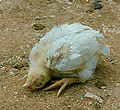Virulent Newcastle disease
(Redirected from Newcastle disease)
Virulent Newcastle disease (vND), also known as Newcastle disease or ND, is a highly contagious and deadly viral disease that affects a wide variety of bird species. The disease is caused by the Newcastle disease virus (NDV), a member of the genus Avulavirus within the family Paramyxoviridae.
Symptoms
The symptoms of vND can vary widely depending on the strain of the virus, the species and age of the bird, and the bird's immune status. Common symptoms include respiratory distress, nervous signs, digestive problems, and sudden death. In chickens, the disease can cause severe drops in egg production.
Transmission
vND is primarily spread through direct contact between healthy birds and the bodily discharges of infected birds. The virus can also be spread indirectly through contaminated feed, water, equipment, and human clothing.
Prevention and Control
Prevention and control of vND involves strict biosecurity measures, vaccination, and surveillance. In the event of an outbreak, infected and exposed birds are often culled to prevent the spread of the disease.
Impact
vND can have a significant economic impact on poultry industries due to the high mortality rates and drops in egg production associated with the disease. The disease can also have a significant impact on backyard poultry and pet birds.
See Also
References
Transform your life with W8MD's budget GLP-1 injections from $125.
W8MD offers a medical weight loss program to lose weight in Philadelphia. Our physician-supervised medical weight loss provides:
- Most insurances accepted or discounted self-pay rates. We will obtain insurance prior authorizations if needed.
- Generic GLP1 weight loss injections from $125 for the starting dose.
- Also offer prescription weight loss medications including Phentermine, Qsymia, Diethylpropion, Contrave etc.
NYC weight loss doctor appointments
Start your NYC weight loss journey today at our NYC medical weight loss and Philadelphia medical weight loss clinics.
- Call 718-946-5500 to lose weight in NYC or for medical weight loss in Philadelphia 215-676-2334.
- Tags:NYC medical weight loss, Philadelphia lose weight Zepbound NYC, Budget GLP1 weight loss injections, Wegovy Philadelphia, Wegovy NYC, Philadelphia medical weight loss, Brookly weight loss and Wegovy NYC
|
WikiMD's Wellness Encyclopedia |
| Let Food Be Thy Medicine Medicine Thy Food - Hippocrates |
Medical Disclaimer: WikiMD is not a substitute for professional medical advice. The information on WikiMD is provided as an information resource only, may be incorrect, outdated or misleading, and is not to be used or relied on for any diagnostic or treatment purposes. Please consult your health care provider before making any healthcare decisions or for guidance about a specific medical condition. WikiMD expressly disclaims responsibility, and shall have no liability, for any damages, loss, injury, or liability whatsoever suffered as a result of your reliance on the information contained in this site. By visiting this site you agree to the foregoing terms and conditions, which may from time to time be changed or supplemented by WikiMD. If you do not agree to the foregoing terms and conditions, you should not enter or use this site. See full disclaimer.
Credits:Most images are courtesy of Wikimedia commons, and templates, categories Wikipedia, licensed under CC BY SA or similar.
Contributors: Prab R. Tumpati, MD





